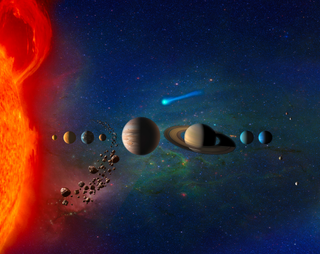Sounds of the Solar System: Podcast Eavesdrops on Planets

Sound is a constant presence for most organisms on Earth, but throughout the rest of the solar system, sound is often entirely absent.
A new episode of the podcast series "Twenty Thousand Hertz" asks the question, "What does it sound like at various locations in the solar system?" With help from a few NASA scientists, the podcast travels from Mercury to Pluto, exploring the factors that would influence or prohibit sound at a particular location.
Mercury, for example, has no atmosphere for sound waves to travel through, so sounds would be absent on the surface of that planet. But vibrations in the planet — Mercury- quakes — would be audible if a person pressed his or her ear to the planet's surface. On Venus, with its very thick, carbon dixode-rich atmosphere, sounds would be muffled, as though they were passing through something thicker than air but thinner than water. (That's assuming a visitor could survive the crushing atmospheric pressure and scalding temperatures.) [Living on Other Planets: What Would It Be Like?]
In the vacuum of space, where there is no atmosphere and no other medium to carry sound waves, a human visitor would hear nothing, and be unable to create sounds, the scientists said.
"You can try and use your lungs to push the sound out of your mouth, but it won't travel anywhere," Laurie Glaze, deputy director of NASA's Solar System Exploration Division at the Goddard Space Flight Center, said in the podcast.
Mars would be much quieter than the movie "The Martian" suggests, the scientists interviewed for the podcast said. Many experts have pointed out that perhaps the most glaring scientific inaccuracy of the movie was the Martian windstorm that was powerful enough to knock over a rocket ship. In reality, the atmosphere of Mars is too thin to create such a powerful storm. That thin atmosphere would also limit the extent to which sound waves could travel, the scientists said.
On the gas giant Jupiter, "you have these superpowerful lightning bolts, more powerful than anything on the Earth, so you'd have really, really loud thunder," Keith Noll, chief of the planetary systems lab at Goddard, said on the podcast. Because of that planet's many cloud layers, Noll said, it's possible you would hear the thunder echoing on and on as it bounced among the different layers.
Get the Space.com Newsletter
Breaking space news, the latest updates on rocket launches, skywatching events and more!
Scientists have picked up "sounds" from solar system bodies, including radio waves from Saturn and vibrations in the magnetic field of Comet 67P/ Churyumov-Gerasimenko. The Mars 2020 rover may carry a microphone to the Red Planet, to make the first traditional sound recordings of another world.
"Twenty Thousand Hertz" is a podcast "about the world's most recognizable and interesting sounds," hosted by Dallas Taylor and produced by Defacto Sound.
To learn more about what it would be like to live on other planets and locations in the solar system, check out this Space.com series of articles.
Follow Calla Cofield @callacofield. Follow us @Spacedotcom, Facebook and Google+. Original article on Space.com.
Join our Space Forums to keep talking space on the latest missions, night sky and more! And if you have a news tip, correction or comment, let us know at: community@space.com.

Calla Cofield joined Space.com's crew in October 2014. She enjoys writing about black holes, exploding stars, ripples in space-time, science in comic books, and all the mysteries of the cosmos. Prior to joining Space.com Calla worked as a freelance writer, with her work appearing in APS News, Symmetry magazine, Scientific American, Nature News, Physics World, and others. From 2010 to 2014 she was a producer for The Physics Central Podcast. Previously, Calla worked at the American Museum of Natural History in New York City (hands down the best office building ever) and SLAC National Accelerator Laboratory in California. Calla studied physics at the University of Massachusetts, Amherst and is originally from Sandy, Utah. In 2018, Calla left Space.com to join NASA's Jet Propulsion Laboratory media team where she oversees astronomy, physics, exoplanets and the Cold Atom Lab mission. She has been underground at three of the largest particle accelerators in the world and would really like to know what the heck dark matter is. Contact Calla via: E-Mail – Twitter
